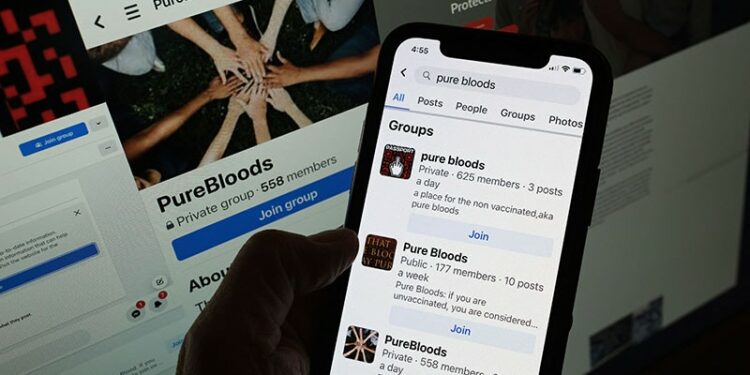A growing number of Canadians encounters health misinformation online, which has resulted in negative health consequences and broken trust for some patients, according to a new survey commissioned by the Canadian Medical Association (CMA).
More than a third of survey respondents said that they seek health information online because they don’t have access to a doctor. About a quarter also said they’ve had a bad health reaction after having followed health advice on the internet.
Notably, the survey found that more Canadians are turning to social media for news, and those who rely on social media for news continue to be the most vulnerable to misinformation, which in turn has led to a significant rise in susceptibility to false health information.
“The survey is really sobering because it shows us something that anyone who works in healthcare has been feeling, where we have a dual issue of people being bombarded with misinformation while also not being able to access healthcare,” said Joss Reimer, MD, CMA president and a hospitalist at Women’s Hospital in Winnipeg, Manitoba, Canada.

About 6.5 million Canadians don’t have a primary care provider, and many people are turning to online sources to solve their health problems on their own, she said, adding that social media algorithms focused on platform engagement often push misinformation into people’s feeds, whether they want to see it or not.
“People have health questions and are seeking information wherever they can get it, which can be filled with misinformation,” Reimer said. “It’s sobering to see this double whammy happen at the same time, and I don’t think any other generation has experienced these issues combined in the same way.”
The results were published online on January 21 by CMA.
Fragmented News Landscape
A week after the US presidential election, Abacus Data surveyed 3700 Canadians about health information and media sources, oversampling for Generation Z (Gen Z) and French respondents. During that time, a growing number of walking pneumonia cases were reported in Eastern Canada, and there were discussions of privatizing healthcare in Quebec.
Overall, the survey found that Canadians’ encounters with health misinformation had increased during the previous year, with more people reporting greater prevalence and harmful effects. About 62% said they see health information occasionally, often, or “all the time.” This proportion increased by 8 percentage points during the past year.
More Canadians said they’re turning to social media for news, increasing by 6 points, and fewer Canadians are visiting news organization websites or apps directly. People remain split about the effects of artificial intelligence, with about a third believing it’ll positively affect coverage, another third saying it’ll negatively affect coverage, and the final third seeing no changes.
The news media ecosystem also remains fragmented by age. About 58% of Gen Z and 37% of Millennials turn to social media as their main way to get the news, while 34% of Gen X and 55% of Baby Boomers look to TV news.
As part of the survey, Canadians responded to a dozen statements, indicating whether they believed each to be true. While 69% agreed that climate change is primarily caused by human activities, 41% said masks don’t stop the spread of airborne illnesses, 28% said sunscreen can cause a vitamin D deficiency, and 21% said 5G technology is a known cause of cancer.
Using these true/false belief statements to create a Misinformation Susceptibility Index, Abacus Data found that 43% of Canadians are highly susceptible to misinformation, including 47% of Gen Z, 49% of Millennials, and 40% of Gen X and Baby Boomers.
For more than a third of Canadians, health-related misinformation has led to mental distress or increased anxiety, lower trust in health professionals, delayed seeking of care, avoidance of certain treatments, difficulty discussing health issues with healthcare providers, and strained relationships with family or friends.
Because of this, 37% of respondents said they had to use medical advice they found online because they couldn’t access a medical professional. In addition, 31% tried medical advice they found online instead of advice from a doctor, and 23% had a bad reaction after following health advice found online. These responses were overwhelmingly more common among survey takers who were categorized as “very highly susceptible” to health misinformation.
“Sometimes it sounds like we’re exaggerating when we say misinformation is a life-or-death issue,” Reimer said. “However, during a recent hospital shift, a patient with a postpartum hemorrhage declined a transfusion because she didn’t want vaccinated blood. It’s heartbreaking because she’s trying to make the best decision for herself and her new child, but the decision is based on bad information, and it becomes a life-or-death issue.”
Combating Misinformation
Current efforts to combat misinformation seem to be falling short, the survey found. Collaborative efforts will be needed to combat misinformation, especially as the news media ecosystem continues to splinter. The CMA has called for initiatives such as Healthcare for Real, which aims to improve the media environment for health information, as well as fund health journalism initiatives and support physicians who share accurate information online.
About 8 in 10 Canadians said they still trust medical professionals such as physicians, pharmacists, and nurses, and about three quarters of survey respondents said they trust Health Canada, the Public Health Agency of Canada, and provincial and local public health organizations. Most survey respondents said that these groups are most responsible for safeguarding Canadians against health misinformation.
In fact, when Canadians see health coverage, 71% said they feel more informed rather than confused, and 75% said they feel they’ve learned something new rather than information they already know.
Although most of the survey data is “very concerning,” Canadians’ ongoing trust of healthcare professionals and public health institutions leaves room for hope, said Theresa Tam, MD, Canada’s chief public health officer.

“Public health works at the speed of trust. If people don’t have trust in our messages and recommendations, then they don’t follow them,” she said. “But I’m somewhat hopeful that the majority of people still have trust, so we can work together to understand how to better gain that trust, maintain it, and provide the information that people want to access to be better informed.”
As part of that effort, Tam noted, medical professionals and health communicators should keep the social determinants of health in mind. Based on the survey data, “Where people exist and live online and in the information ecosystem is as important as where we physically live, work, and play,” she said.
“Hope leads to action,” Tam added. “So, it behooves us to take action.”
Reimer and Tam reported no relevant financial relationships.
Carolyn Crist is a health and medical journalist who reports on the latest studies for Medscape Medical News, MDedge, and WebMD.
Source link : https://www.medscape.com/viewarticle/increasing-number-canadians-faces-health-misinformation-2025a10001nl?src=rss
Author :
Publish date : 2025-01-23 11:21:52
Copyright for syndicated content belongs to the linked Source.














